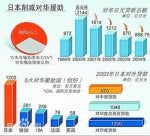From -
http://digital.library.unt.edu/ark:/67531/metacrs13/m1/1/high_res_d/91-216f_1991Mar07.txt
-ti- Japan's World War II Reparations: A Fact Sheet
March 7, 1991
Congressional Research Service Report
Larry A. Niksch
Specialist in Asian Affairs Foreign Affairs and National Defense
Division
Japan,s war reparations following World War II came in two
stages. In the first, 1946-1949, U.S. and allied governments
arranged for U.S. occupation authorities to ship about $160
million in Japanese industrial equipment to China, the
Philippines, Indonesia, and the British colonies in East Asia.
The second stage resulted from the 1951 Trealy of Peace between
Japan and most of the allied nations. The treaty required Japan
to negotiate reparations agreements with countries, whose
territories Japan had occupied during the war. Over the next
eight years, Japan negotiated major reparations agreements with
Burma, the Philippines, and Indonesia.
It also concluded minor accords with South Vietnam, Laos, and
Cambodia. Japan did not conclude an agreement with China. The
Chinese Nationalist government on Taiwan declined reparations,
and Japan did not have diplomatic relations with the Communist
government on the Chinese mainland. That government said it would
not seek reparations when it established diplomatic relations
with Japan in 1972.
The agreements with Burma, the Philippines and Indonesia are
summarized:
Agreement with Burma, 1954 -- Japan provided $200 million in
free goods and services, and $50 million in loans;
Agreement with the Philippines, 1956 -- Japan provided $500
million in free goods over a ten-year period; $30 million in
technical services; $20 million in payments to war widows and
orphans; and $250 million in long-term loans;
Agreement with Indonesia, 1958 -- Japan provided $223 million
in free goods over 12 years, and $400 million in private loans
and investment; Japan also canceled a $177 million Indonesian
debt to Japan.
CRS-2
In 1965, Japan and South Korea agreed to establish diplomatic
relations. In the agreement, Japan promised to provide $300
million in grants and $200 million in 25-year, low-interest
loans. The agreement did not use the word reparations. The
Koreans, however, did describe it as a reparations agreement.
Recently, Japanese officials have described the aid as
reparations, as they began negotiations with North Korea at the
end of 1990 over an agreement to normalize relations that likely
would provide for Japanese reparations payments to North Korea
for the period of Japanese colonial rule over Korea.

